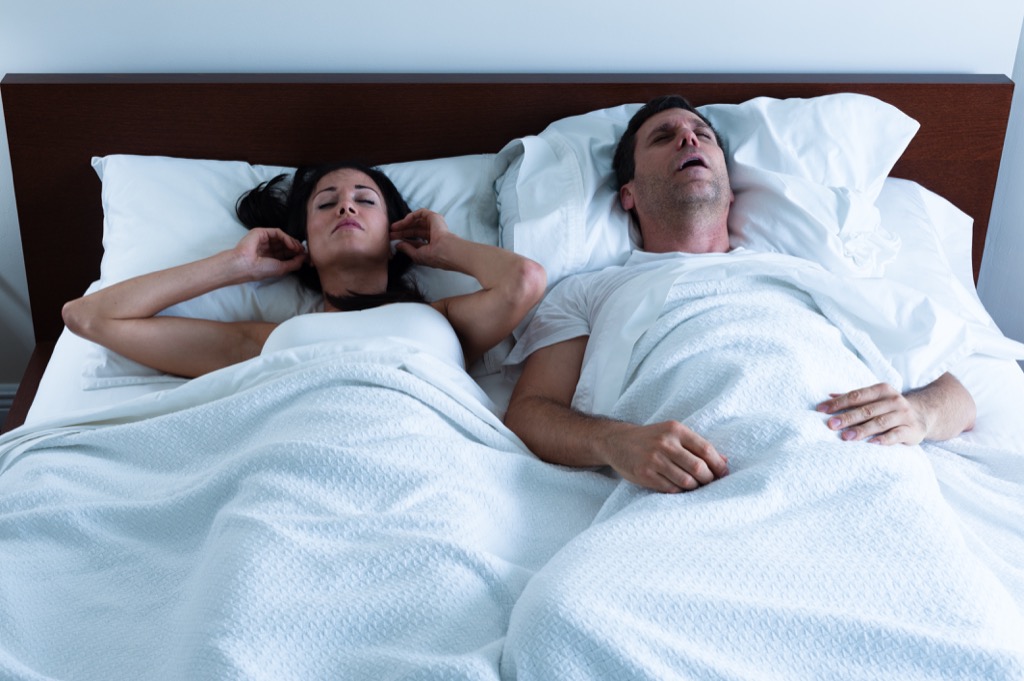The funny thing about snoring is that you only hear about it secondhand. Though it’s a condition that afflicts you, the true sufferer, of course, is the poor soul who has to sleep next to you. And as anyone who’s gotten into a spat over the matter knows, ending those not-so-dulcet sounds once and for all isn’t so easy. So how to proceed?
Well, for starters, you could try the Holy Trinity of medical solutions: Drinking less, losing weight, and quitting smoking—all of which will help mitigate the problem. (For the record: Alcohol is natural relaxant that causes throat muscles to relax, while overweight folks have more fatty tissue in the throat, and both issues create excess blockage—which in turn causes snoring. The smoking thing should be obvious.)
there’s more to snoring than meets the ear. According to the folks at the British Snoring & Sleep Apnea Association, there are exactly five types of snorers: nose snorers, mouth breathers, tongue snorers, palatal flutterers, and multifactorial snorers. If you snore—and 45 percent of Americans do—one of these solutions will do the trick. And once you’ve ensured no one has to sleep on the sofa ever again, master the art of falling asleep on a dime with the 11 doctor-approved tricks for dozing off instantly.

1 Nose snorers
Nose snoring is caused if there’s obstruction in nasal passages or if your nostrils tend to collapse. This forces you to breath through your mouth and leads to snoring. To fix this issue, you’re best bet is to turn to nasal strips or spray, or a nasal dilator. (Some great recs: SnoreStop NasoSpray, $13, available at SnoreStop; Breath Right Nasal Strip, $11, available at Target; and Rhinomed Mute Nasal Dilator, $15, available at Amazon.) All three will aid in clearing any blockage. (Though be very careful not to overuse nasal spray, and consult your doctor if the storing continues. Though uncommon, your body could develop a tolerance to the stuff in only a matter of days, reducing its efficacy. In other words, you may have to continually up the dose to get any relief.) And for more great sleep advice, learn the 25 most common sleep myths of all time.

2 Mouth Breathers
No, we’re not talking about the weird guy in accounting with the ill-fitting chinos. A mouth breather—at least when it pertains to snoring—is someone with an abnormally relaxed jaw. When mouth breathers fall asleep, their jaw goes slack, leading to snoring. You can approach this issue in two ways. First, try chin-up strips, which will keep your mouth closed. (Best Life recommends the Beyoung Anti-Snoring Chin-Up Strip, $10, available at Amazon.) If that doesn’t work, try a snore guard—such as the SnoreRx Snore Guard for $100 at SnoreRx—which regulates airflow and helps prevent the problem.

3 Tongue Snorers
Tongue snoring is caused if the snorer’s tongue drops to the back of their mouth, blocking the airways. The subsequent turbulent airflow leads to intense snores. If you’re a tongue snorer, the solution lays in a thingamajig called a mandibular advancement device. (For the record: You’ll need a doctor’s recommendation to procure a mandibular advancement device. Per the American Sleep Association, they start at around $1,600 and can cost up to $2,200.) This will pull your jaw and tongue forward—it doesn’t hurt, don’t worry—allowing extra room for airflow, helping minimize the issue. And if you’re drowsy during the day due to snore-impeded sleep, learn the one best way to power through your afternoon slump.

4 Palatal Flutterers
A palatal flutterer is if the palatine uvula (that’s the thing that creates saliva) and the muscular palate (that’s the thing that closes off your nasal passages while you eat) both vibrate during the middle of the night. The vibration disrupts airflow and causes snoring. If you’re a palatal flutterer, try out mouth spray—more or less nasal spray for your mouth, such as the SnoreStop Extinguisher Anti-Snoring Sprap ($20; available at Rite Aid)—which can relax the two glands and prevent them from vibrating.

5 Multifactorial Snorers
Simply put, a multifactorial snorer is someone who suffers from two or more of these conditions. You may try to combat the problem by combining several of these solutions in tandem—the strips, the sprays, the silly-looking contraptions—but the truth its: it’s probably time to see the doctor. And now, for more on sleep, here’s why men fall asleep after sex (and women don’t).












